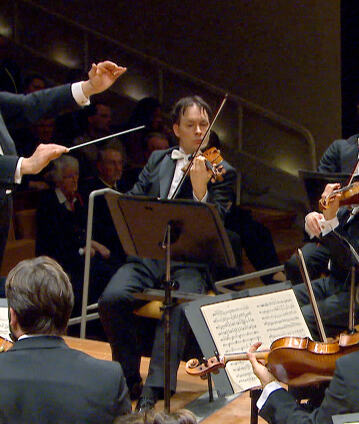Zubin Mehta conducts Bruckner’s Symphony No. 9

Anton Bruckner dedicated his last symphony “to God the Beloved”. Yet here he not only created a valedictory work, but ventured into new, modern harmonic spheres. In this concert from February 2014, conductor Zubin Mehta couples the symphony with George Crumb’s song cycle Ancient Voices of Children, which likewise looks towards the transcendent, but from the perspective of the 20th century.
Bruckner shrugged it off when his contemporaries compared the D minor of his Ninth Symphony with Beethoven’s Ninth: “How could I help that the main theme occurred to me in D minor? After all, it’s my favourite key! The number nine weighed a bit more heavily on him: Beethoven is said to have rounded off his life with the Ninth, and Bruckner also bid farewell with his last symphony, choosing that word himself to describe the gently descending chorale that introduces the Adagio’s second thematic complex.
In this work – whose completed movements are among the greatest of the 19th century – Bruckner consolidates the achievements of his previous symphonies. The Ninth is also marked by strong dynamic contrasts and an indulgence in the splendours of the full orchestra. The organ-like scoring in the work suggested Gothic cathedrals to the ear of Bruckner scholar Ernst Kurth. But its monumentality, harmony and handling of dissonance – a conflict between ecstatic vision and catastrophic collapse – foreshadowed Gustav Mahler.
Before the Bruckner we hear the song cycle Ancient Voices of Children by the American Mahler admirer George Crumb. A theatrical masterpiece based on Lorca poems, it features one of the most virtuoso vocal parts in the 20th-century repertoire. An old friend of the orchestra, Zubin Mehta, will be on the podium. In Crumb’s orchestral songs, the Philharmoniker accompany soprano Marlis Petersen, who has made a name for herself not only in classical coloratura roles but also as an accomplished and sensitive interpreter of contemporary music.
© 2014 Berlin Phil Media GmbH
Related interviews
Artists
Our recommendations
- Inaugural concert: Kirill Petrenko conducts Beethoven’s Ninth Symphony
- Kirill Petrenko conducts Beethoven’s Ninth Symphony at the Brandenburg Gate
- Zubin Mehta and Anoushka Shankar
- A “St Petersburg Night” with Daniel Barenboim and Zubin Mehta at the Waldbühne
- Benefit Concert of the Federal President of Germany with Zubin Mehta and Pinchas Zukerman
- Zubin Mehta and Yefim Bronfman